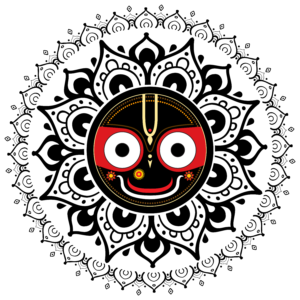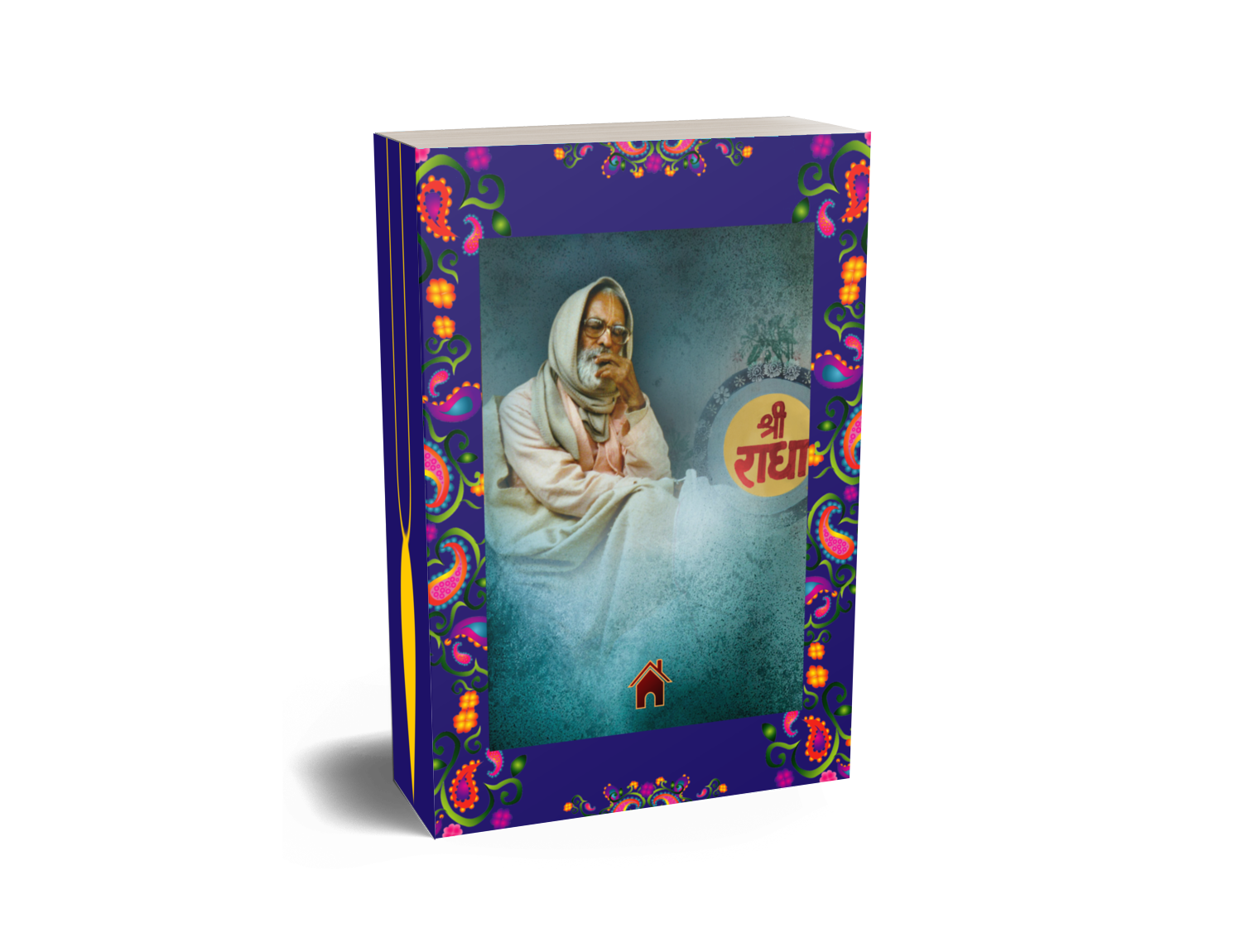

The following is a transcription of a discourse delivered by Śrīla Bhaktivedānta Nārāyaṇa Mahārāja in Navadvīpa on March 20, 2008
(This class was given during the Navadvīpa-dhāma parikramā, on the day that devotees went to Lord Rāma’s abode on the island of Modadrumadvīpa. This class was transcribed from Śrīpāda Dāmodara Mahārāja’s translation of his Bengali discourse, given in Śrī Keśavajī Gauḍīya Maṭha on the island of Koladvīpa:)
By the mercy of Śrī Śrī Guru and Gaurāṅga, today we completed the fifth and final day of our Śrī Navadvīpa 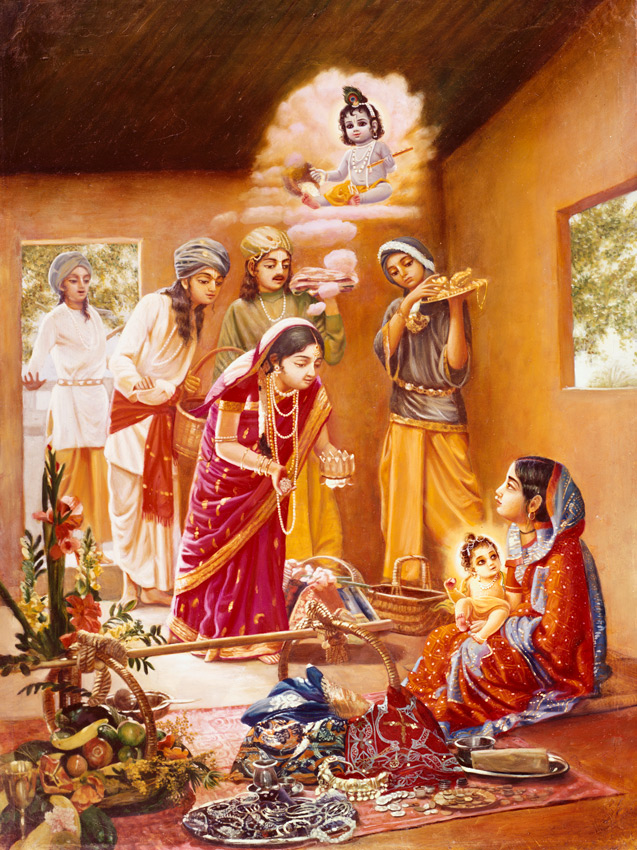 Maṇḍala Parikramā. Even though there are over 17,000 devotees in attendance, we have had no complaints, and all are very happy.
Maṇḍala Parikramā. Even though there are over 17,000 devotees in attendance, we have had no complaints, and all are very happy.
Tomorrow is the appearance day of Śrī Caitanya Mahāprabhu. We will observe a complete fast tomorrow and engage in the unbroken recitation of Śrī Caitanya-bhāgavata. We will begin here in the temple in the morning.
Even though we may have experienced some minor difficulties and discomforts, when we go home we should tell everyone that parikramā was very wonderful; we had very nice prasādam, and there were no difficulties. Otherwise, others will not come next year.
No one could have arranged such a vast parikramā – we did not arrange it. Raising our arms in the air, we simply chanted “Jaya Nitāi! Jaya Gaura!” Actually, Śrīman Mahāprabhu has been personally making all the arrangements.
Today, we first went to Jahnudvīpa. There in Jahnudvīpa we heard the story of how Jahnu Ṛṣi drank the Ganges River, which was brought to the Earth planet by Bhagīratha Ṛṣi. Jahnu Ṛṣi then released the Ganges from his thigh, so Gaṅgā-devī is also known as Jāhnavī-devī.
We then went to Māmagāchī, the birthplace of Śrī Vṛndāvana dāsa Ṭhākura, who is the Vyāsa of the pastimes of Śrī Caitanya Mahāprabhu, and the nephew of Śrīnivāsa Ācārya. We took mahā-prasādam there. Śrī Caitanya Mahāprabhu would go to Māmagāchī with all of His associates and perform many pastimes there.
We then went to the place of bhajana of Śrī SāraṅgaṬhākura. In his old age, Sāraṅga Ṭhākura was ordered by Mahāprabhu to make disciples to assist him with his services. He replied that there were no qualified disciples. Mahāprabhu told him that he (Sāraṅga Ṭhākura) can make them qualified. Because of Mahāprabhu’s insistence, he vowed to accept the first person he would see the next day as a disciple. The next morning, when he went to bathe in the Ganges, he saw the dead body of a boy floating in the water. Remembering Mahāprabhu’s order, he brought that dead body to the riverbank and recited the dīkṣā-mantras into his ear. As soon as the mantra entered his ear, the boy returned to life and became his initiated disciple.
In Tretā-yuga, Lord Rāmacandra, Sītā-devī, and Lakṣmaṇa went to Māmagāchī. Under the shade of a large 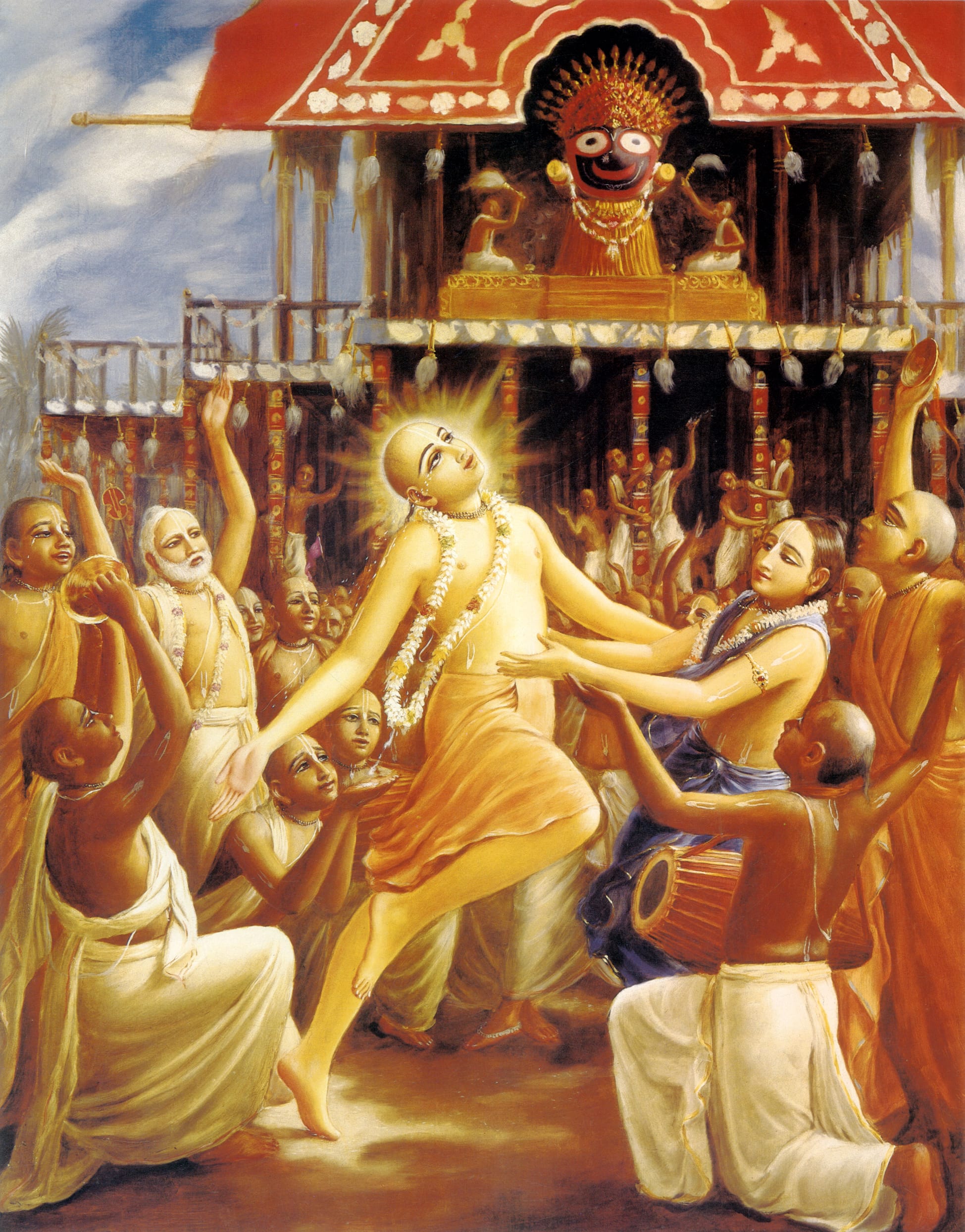 banyan tree, Sītā-devī observed that Lord Rāma was smiling mildly.
banyan tree, Sītā-devī observed that Lord Rāma was smiling mildly.
She inquired, “O Lord, what is the cause of your amusement?”
Lord Rāma replied, “O Devī, this Navadvīpa is very dear to Me. At the beginning of the upcoming Kali-yuga, I will come here in the form of Śrī Caitanya Mahāprabhu, and You, Sītā, will come here as Śrīmatī Viṣṇupriyā. I will take sannyāsa and go to Jagannātha Purī.”
Then Sītā asked, “O Lord, what is the reason for Your taking sannyāsa?”
In prema, pure divine love, there is meeting and separation. During meeting there is external meeting, and in that happiness, the devotee forgets everything internal. But during viraha, separation, he or she remembers the pastimes of meeting. Meeting with the Lord is certainly one type of happiness, but separation is another type of happiness. Therefore, sādhakas (practitioners of devotion to Śrī Kṛṣṇa) in this world perform bhajana in the mood of separation by remembering the pastimes of Śrī Śrī Guru and Gaurāṅga.
What is the condition of Śrīmatī Rādhikā when Kṛṣṇa went to Mathurā and Dvārakā? The prema of Rādhikā is not expressed directly; it is not straightforward. It is very crooked, and therefore it binds Śrī Kṛṣṇa. Especially regarding the condition of māna, transcendental jealous anger, Candrāvalī will not directly express displeasure or say anything contrary then. But Rādhikā may say many things, and Kṛṣṇa becomes controlled by Her type of māna. A river is not very beautiful when it has only a few waves, but the ocean is very attractive because it contains so many astonishing varieties of waves.
Similarly, in separation, both the Lord and His beloved feel many wonderful and astonishing moods. Moreover, 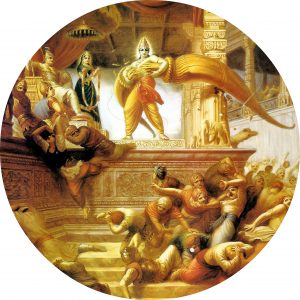 the meeting that occurs after separation is especially relishable.
the meeting that occurs after separation is especially relishable.
Now Lord Rāma told Sītā, “O Devī Sītā, your father took a vow to marry You to that person who could lift the bow of Lord Śiva. Many powerful kings like Rāvaṇa came, but they could not lift it. I also came with Lakṣmaṇa at that time, and that was Our first meeting – in the garden of Janaka Mahārāja.”
At that time, Lord Rāma and Sītā exchanged glances, and both captured each other’s hearts. Soon after that, when Rāmacandra lifted the bow, Sītā was beside Herself with happiness. She wanted to put the vijaya-mālā, the ‘victory garland,’ around the neck of Lord Rāma, but she was feeling such ecstasy that She could not move. Her friends had to lift Her arms and place the garland around His neck.
Later, unknown to Lord Rāma, after He abandoned Sītā-devī, She gave birth to two sons, Lava and Kuśa, in the āśrama of Śrī Vālmīki Muni. There, in his āśrama, they learned the sixty-four arts.
They once went to the palace of Rāmacandra and began to sing the Rāmāyaṇa that they had learned from Vālmīki. There they saw the most astonishing sight: a golden form of their mother. They did not know that their mother was Sītā. As they sang the Rāmāyaṇa in a very sweet voice, everyone began weeping – Rāma, Lakṣmaṇa, and all others.
Rāma was especially attracted. He called Lakṣmaṇa and said, “Please go to these boys and ask them, ‘Who is 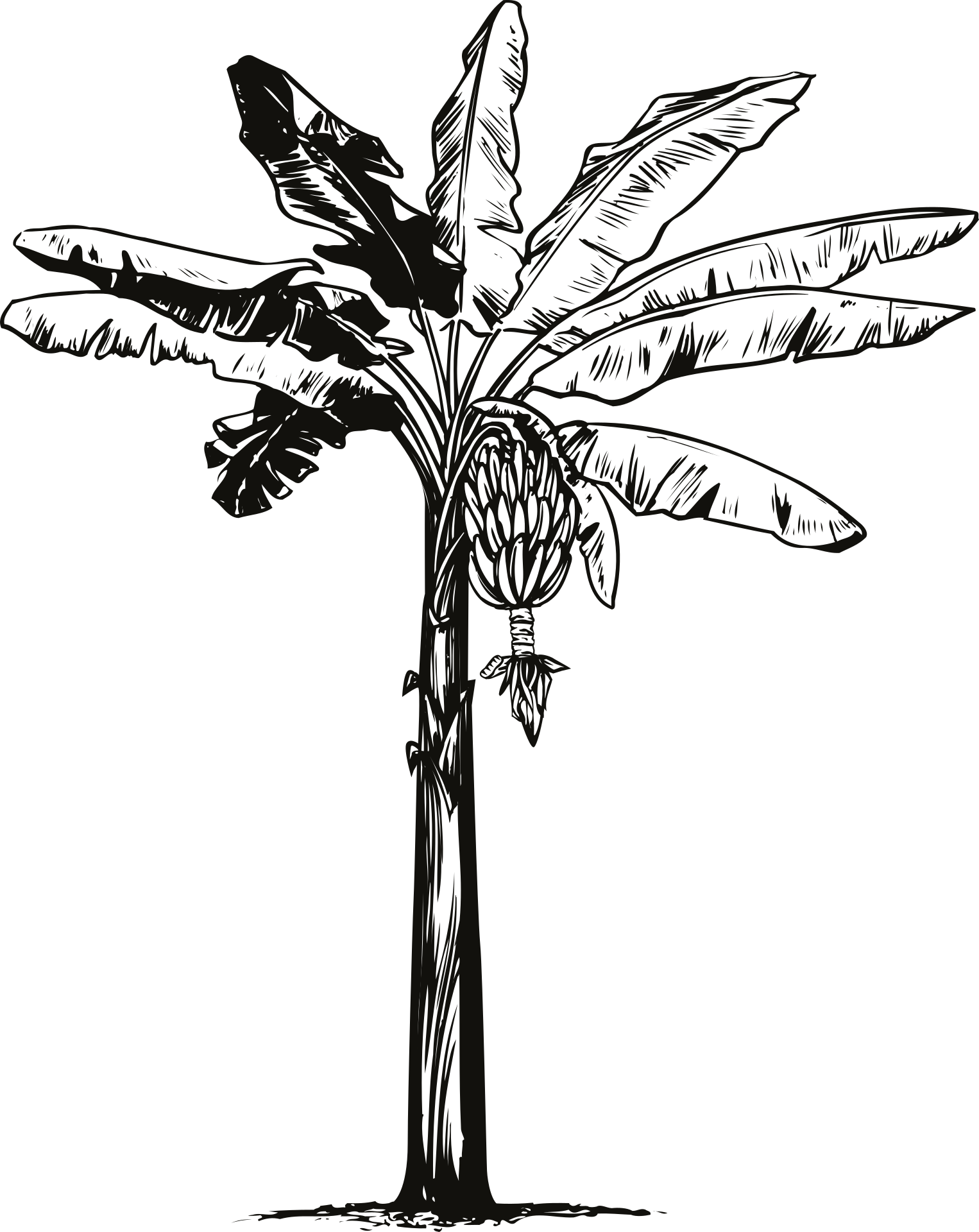 your mother and father?’” Lakṣmaṇa took a big container of jewels and gold as a donation for them. Lakṣmaṇa said, “Lord Rāma is very pleased with you two boys. Please, we want to know who your mother and father is.”
your mother and father?’” Lakṣmaṇa took a big container of jewels and gold as a donation for them. Lakṣmaṇa said, “Lord Rāma is very pleased with you two boys. Please, we want to know who your mother and father is.”
Lava and Kuśa replied, “Oh, considering that You are a brother of Lord Rāmacandra, You are not very intelligent. We are brahmacārīs, so why are You asking who is our mother and father? All we know is that our Gurudeva is Śrī Vālmīki; that is all we know. We also do not need these jewels and gold and silks. We live in the forest and eat roots, shoots, and fruits; we do not need these at all. We take bark from the trees if we need some cloth.”
That day, Lava and Kuśa returned very late to the āśrama of Vālmīki. Because they did not know that Lord Rāma was their father and that their mother was Sītā-devī, they said to their mother, “O Mother, today we saw a most astonishing thing. As we sang the Rāmāyaṇa, and all were vastly attracted, we saw that King Rāma had a golden form of a woman who is the exact replica of You.”
Hearing this, Sītā began to weep. She could understand that although the King had left the Queen, Rāma had not left Sītā. She wept bitterly.
During Her separation from Lord Rāma when He was in Ayodhyā and She was in the āśrama of Vālmīki Muni, Sītā was absorbed in remembering the happiness of Her first meeting with Him, the happiness She felt upon placing the victory garland around His neck, and so many other pastimes with Him. All these pastimes that took place in meeting, She remembered in separation.
When Śrī Kṛṣṇa went to Mathurā and then to Dvārakā, Rādhārāṇī experienced mohana, or mohanākhya-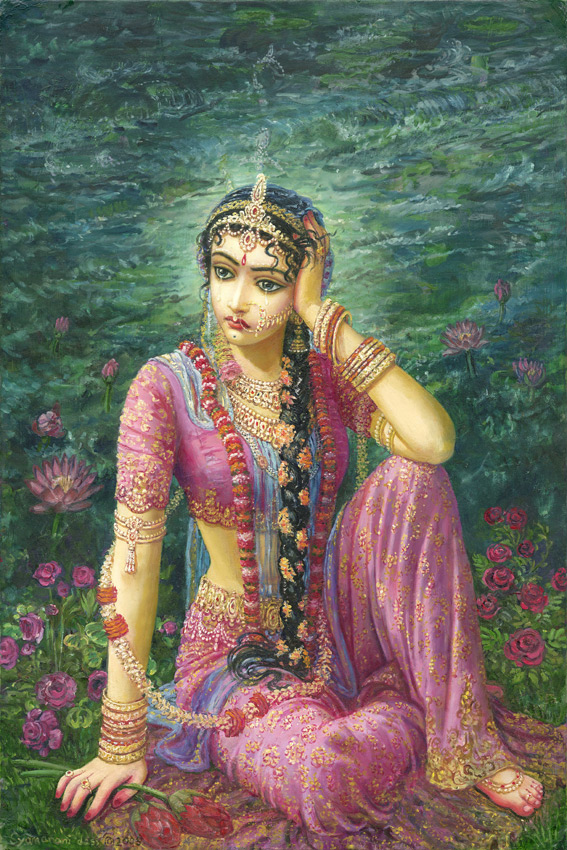 mahābhāva, and in divine madness, She chastised a bumblebee. In separation from Kṛṣṇa, Śrīmatī Rādhikā sometimes embraces a tamāla tree or the darkness. Therefore, in vipralambha, separation from Kṛṣṇa, there is a great remembrance of the happiness of meeting with Him.
mahābhāva, and in divine madness, She chastised a bumblebee. In separation from Kṛṣṇa, Śrīmatī Rādhikā sometimes embraces a tamāla tree or the darkness. Therefore, in vipralambha, separation from Kṛṣṇa, there is a great remembrance of the happiness of meeting with Him.
Śrīla Viśvanātha Cakravartī Ṭhākura and Śrīla Sanātana Gosvāmī have said that the happiness of separation dances on the head of any happiness that is experienced in meeting.
Lord Rāma now told Śrīmatī Sītā-devī, “O Devī, I will come to this Navadvīpa. I will take birth from the womb of Mother Śacī, and I will take sannyāsa and go to Jagannātha Purī – and You will stay here in Navadvīpa and worship My mūrti (divine, worshipful statue).” That mūrti is here in Navadvīpa; it is known as Soṇāra Gaurāṅga.
Separation is such a wonderful thing. Both the devotee and the Supreme Lord taste the astonishing waves of meeting and separation.
Tomorrow is the janma-utsava (Appearance Day Festival) of Śrī Caitanya Mahāprabhu. To respect the Lord, the devotees observe a complete fast until abhiṣeka (the auspicious bathing ceremony of the Deity), which is at 6 p.m. After maṅgala-ārati tomorrow, the devotees will begin the continuous reading of Śrī Caitanya-bhāgavata here.
Gaura-premānande! Haribol!
Source: Purebhakti.com
Image(s) made possible by Pixabay.com, Krishnapath.org and/or Bhaktiart.net
Unless indicated differently, all verse translations and quotes are from the books by Śrīla Prabhupāda (Vedabase.com)